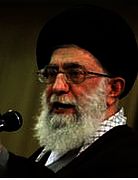Khamenei’s Advisors Respond to Obama’s Letter
» “There is Nothing New in the Works”
Two most senior advisors to Iran’s leader responded to US President Obama’s letter to ayatollah Khamenei. Seyed Yahya Rahim Safavi, an aide and advisor in military affairs and Ali Akbar Velayati, advisor in international affairs to ayatollah Khamenei separately confirmed the receipt of a letter from the US.
The New York Times on Friday reported that President Obama had sent a secret letter to the leader of the Islamic regime containing a warning over the Straits of Hormuz, calling it a Red Line not to be crossed. General Rahim Safavi, the former Revolutionary Guards commander and currently a military advisor to Khamenei responded publicly on Saturday saying, “If Iran is endangered,” the Islamic republic would use “political and other means” to defend itself.
He called the Straits of Hormuz “a strategic passage for world trade and for the world’s energy” and added that the Islamic republic viewed the security of the straits to be a “collective security.”
A few hours after Safavi’s comments, Velayati’s remarks were published in the country’s media. “Responsible authorities will comment and make their decision,” he is reported to have said. He did not identify who these authorities are but did add that there was “nothing new,” in the letter.
In the published remarks attributed to Rahim Safavi there is no mention or threat about closing the Straits of Hormuz by the Islamic republic if an embargo is placed on the purchase of Iranian oil, something that a number of Iranian officials had said recently. Velayati however did say that “oil is not a commodity that anyone can put an embargo on and Iran can easily sell its oil.” He added that there was “always more demand for Iran’s oil than the amount that was produced.”
The Confrontation Over the Straits of Hormuz
The debate over the embargo of Iranian oil is among the policies that the West is pursuing to halt Iran’s controversial nuclear program. Some senior Iranian political and military authorities had recently threatened that if Iran’s oil was embargoed, the country would shut the Straits of Hormuz and prevent the flow of any country’s oil through the passageway.
Iran’s previous foreign minister Manoutchehr Mottaki, who said he did not know of the contents of the letter to ayatollah Khamenei, sounded a different note and said, “By talking about more sanctions, the Americans wanted to and were concerned about stepping into an uncertain area but they were checkmated by the Islamic republic. Then they tried to prevent some issues.”
Senior American civilian and military authorities had declared that they would not allow the Islamic republic to shut the Straits of Hormuz. The Prime Minister of the UK also said that Iran would not be allowed to threaten the security of the straits.
After the New York Times announced that President Obama had sent a letter to Iran’s leader in which he declared the Straits of Hormuz to be “Red Line” whose crossing the US would not tolerate, the spokesman for Iran’s foreign ministry Ramin Mehmanparast confirmed that the US ambassador to the UN had submitted a letter from the US President to Iran’s UN representative, while another copy was handed over to Iranian authorities by the Swiss ambassador in Tehran and that a third copy was received from Iraq’s president Jalal Talebani. He also said that “Iran was studying” whether to respond to the letter or not, and added, “If the decision is to respond, then it will be done appropriately.”
Saudi Arabia to Fill Iran’s Oil
In the meantime, Saudi oil minister announced that his country was ready to fill the oil gap if Iran’s oil were embargoed. Ali al-Naimi told CNN that all his country had to do was “open the oil taps just a little more” to immediately add 2 million more barrels a day to the world supply.
Saudi Arabia currently produced about 9.5 million barrels a day while Iran’s production stands at about 2.5 million barrels.
The Saudi announcement comes despite a warning by Iranian authorities a few days earlier to other oil producers not to raise their oil production. Iran had threatened that any country that raised its production to replace Iran’s oil would be responsible for any action that was taken regarding the embargo on Iranian oil.
The foreign ministers of the European Union are scheduled to decide on embargoing Iran’s oil next Monday. The French foreign minister has said that all 27 members of the union have agreed in principle on the issue. The EU imports about 20 percent of its oil needs from Iran.


